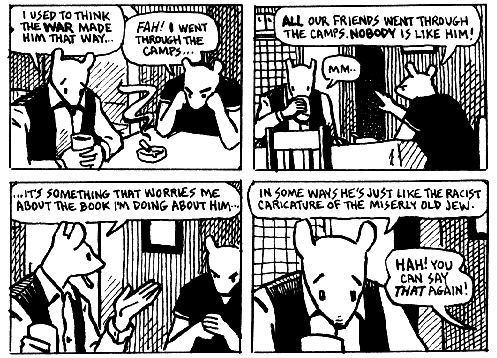
A Family Affair: The feelings of Children of Holocaust Survivors


Art Spiegelmans comic book of the experiences of his parents in Auschwitz is not an objective documentary. Rather it shows objectively the relationship that Vladek and Art have, the feelings of guilt that Art must deal with in order for that relationship to bloom, and the desire for increased understanding of the experiences that molded his father. These aspects of the book are as important as the chronological telling of Vladek's story. In attempting to capture his relationship with his father in the form of a comic book, Art must be realistic about his feelings for his father, both before, during and after the project of documenting his life in this way. Spiegelman states in an interview on The Complete MAUS, a CD-ROM addition to MAUS, that his father really didn't have a need to be a testimonial of the horrors of the camps. His direct need was to spend time with his son, and this was a good way to do just that. The relationship between the two men grows and, as the book progresses, they attempt to move beyond the petty arguments that they have when the project is just beginning.

MAUS required so many hours of interviews that Vladek and Art's relationship could not help but change as the interviews progress. This is documented in the book as Art wrestles with his feelings of resentment for his father and for his won existance. Art must come to terms with the fact that he can never really know what it was like for his parents in the ghettos and camps. The fact that he was born after their liberation prevents any first hand knowledge. Accepting this fact is integral to the changes that take place in Art's personality.
On page 44 of Volume II, Art is discussing his feelings of inadequacy with his psychiatrist, Pavel. (Pavel is a Hungarian Jew, survivor of Auschwitz and Terezin and lover of cats. Spiegelman wonders aloud so to speak in the book about whether including this fact will cause problems with his metaphor.) At this point in the book, Art is drawn as a child, to represent his feelings of inadequacy, and he speaks of why he believes that he can never measure up to his father. Art says, "No matter what I accomplish, it doesn't seem like much compared to surviving Auschwitz." On the next page Pavel goes about trying to help Art work through some of these feelings. He explains that the survivors of the camps were not necessarily the best, nor were the best the ones that were killed. The killing was random, and because of that fact, being able to survive depended as much on luck as on resourcefulness. Through this conversation, the reader begins to understand what Art has to come to grips with. This problem is not unique to Art. Many children of Holocaust survivors have similar feelings which are expressed in narratives on the Cybrary of the Holocaust, Children of Survivors web page. This link leads to poetry and prose written by children of survivors. The poetry tells the story that could not be told in other ways as children and now grown adults. These stories, when viewed with the images that remain of what occurred in these camps, give a better understanding of Art's struggle to cope with his fathers past.